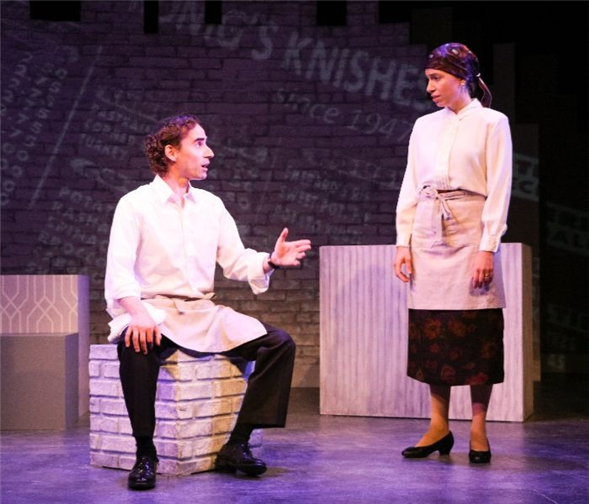Translate Page

How Goy Friendly and The Sabbath Girl bring people of different faiths together
---
On the surface, Ashley Blaker's solo show Goy Friendly and Cary Gitter's rom-com The Sabbath Girl don't seem to have much in common. They're markedly different in format, tone and narrative. Yet at the heart of each is a story of people of different faiths coming together. At this time of growing anti-Semitism, that message is an urgent one.
Blaker is a British-Orthodox Jewish stand-up whose Goy Friendly, currently at Soho Playhouse, came out of his friendship with Imran Yusuf, a Kenyan-British-Muslim comedian. When the two toured together, Yusuf asked questions about Judaism that expanded Blaker's understanding of both their religions. Their enlightening and entertaining conversations make up much of the script.
Blaker says that when he and Yusuf performed on the same bill, they brought people who might not normally socialize together. He recalls seeing Muslims and Jews in their audience sharing laughs and even email addresses, and he hopes Goy Friendly has a similar effect. "I think I've managed to write something that works for both Jewish and non-Jewish audiences," he says, noting how vital finding common ground is these days, even for Jews. "We can't ever agree with each other!" he jokes.
The Sabbath Girl—which premiered at Penguin Rep Theatre upstate and begins its NYC engagement next week at 59E59 Theaters—is about an unexpected interfaith romance between Seth (Jeremy Rishe), a divorced Orthodox Jewish man with a knish store, and his cynical Italian-American-Catholic neighbor, Angie (Lauren Annunziata). They meet-cute when Seth asks Angie to turn on his air conditioner because it's against his religion to touch appliances on the Sabbath.
Gitter describes his play as "a modern millennial take on an old-fashioned story," inspired by the films he grew up watching with his father on Turner Classic Movies. He cites the work of Nora Ephron and particularly the play-turned-movie Crossing Delancey as influences—quintessential New York love stories with a Jewish sensibility. "My intention was to write an intimate romantic story, but I feel like it has a different feeling now because of what's going on," he says, referring to the rise in anti-Semitic hate crimes. "I think the play has a political quality just by being about people coming together across differences."
Even putting an observant Jewish character center stage feels like a statement to Gitter. "Outside of Fiddler, I've never seen Orthodox Jews on stage," he says. "We're at a time when if that character walked out of the theatre, who knows if he'd be safe or get yelled at or attacked."
While The Sabbath Girl leans into its Jewishness, Blaker says that Jewishness is "the subject, not the style" of Goy Friendly. He doesn't go for easy cultural yuks; instead he hopes his humor prompts audiences to see his religion from a fresh perspective, even if they're Jewish. "I'm not really interested in doing 20-minute spots in stand-up clubs where you laugh and then you forget everything within a half hour," he says. "I want the audience to take something away, and I want to have a lasting impression." Above all, he wants everyone to know that "I'm Jewish and I love it. I think at this time, Jewish pride is really important."
Gitter agrees. "I think any stories that depict a particular community very specifically and vividly are just great," he says. "When I see stories about communities other than my own, I feel like I have a window into them. So hopefully people who are not Jewish can feel that way when they see Jewish characters portrayed with authenticity."
---
Linda Buchwald tweets about theatre at @PataphysicalSci. Follow TDF at @TDFNYC.
Top image: Jeremy Rishe and Lauren Singerman in The Sabbath Girl at Penguin Rep Theatre in Stony Point, NY. Photo by Chris Yacopino.
TDF MEMBERS: Go here to browse our latest discounts for dance, theatre and concerts.